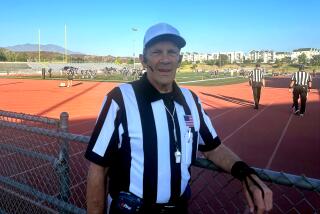Referee Kari Seitz has been there, done that
LONDON-- No U.S. woman has participated in more soccer World Cups than Kari Seitz. And last week she took the field in her third consecutive Olympic soccer tournament, a total surpassed by only one American.
Yet there’s a good chance you’ve never heard of her. And that’s a good thing because Seitz is a referee, and for an official, anonymity is often the reward for a job well done.
Just don’t make the mistake of thinking it’s a job easily done.
“There’s a lot to it,” says Seitz, who was given the high honor of opening the London Olympics when she blew the whistle to start the women’s game between Great Britain and New Zealand last Wednesday, the first competitive event of the Games. “You have to run. Sometimes it’s longer, more miles than the players. I have to be thinking at all times. And there’s no breaks.
“As a referee you can’t afford to have any lack of concentration. You can’t afford to be tired.”
Or sick or hurt or even slightly uninterested. Because while there are 216 female soccer players in these Olympics — 18 chosen from each of the 12 countries in the tournament — there are only 12 head referees.
Total.
And the candidates for those jobs come not from one country but more than 100.
“This isn’t something we do as a hobby,” Seitz says.
But it’s not something you can do as a profession either. Although the work is nearly year-round — Seitz does college and semipro games and used to do Major Soccer League matches in addition to major international events — officiating doesn’t pay the bills.
For that Seitz works as a general manager for a San Francisco-based ad agency. Still, soccer remains more than a full-time job, with the conditioning alone eating up large chunks of each week.
Referees must pass fitness tests, with the degree of difficulty rising steeply as officials advance from high school and college matches to MLS and eventually international tournaments. To work the Olympics, referees must complete a series of six 40-meter sprints — each in 6.6 seconds or better — then run 21/2 miles around a track, alternating between 20 150-meter bursts and the same number of 50-meter walks.
Fail either test by even a hundredth of a second and you’re on your way home the next morning.
Seitz is one of five U.S. officials participating in the Olympic tournament. On the women’s side Sacramento’s Veronica Perez and Huntington Beach’s Marlene Duffy are serving on Seitz’s three-person crew as assistant referees; head referee Mark Geiger and assistant Sean Hurd will work the men’s tournament.
Seitz, however, is the most decorated of the five.
“She’s probably, male or female, the most experienced referee that we have. And she’s definitely one of the elite referees of our generation,” says Sandra Serafini, who runs the referees’ development and training program for U.S. Soccer and serves as the liaison with FIFA, the world governing body for the sport.
“There’s definitely a skill set. You’re certainly a manager of your crew as a head referee. You have to be very comfortable in situations where, culturally or linguistically, there may be big differences and still be able to work as a team together.”
From the time she was a child, playing on an all-boys’ team in a small Michigan town, Seitz knew her future was in soccer. She just wasn’t sure where or how.
“I was a goalkeeper. I’m 5-foot-4,” she says with a shrug. “So that wasn’t going to last forever.”
But when she attended an opening-round game of the 1994 World Cup in Chicago, she remembers being captivated by the referee, Arturo Brizio Carter of Mexico.
“I’ll never forget that,” she says. “Him walking out, just the way he did. The way he commanded the game. And I said that’s what I’m going to do.
“I didn’t know how you got there. I never thought about it being man-woman. Who cares? I just went for it. And luckily I had a lot of people in my career who helped me out because you can’t get there on your own.”
Nearly two decades, four women’s World Cups and three Olympic tournaments later, Seitz thinks a lot about it being man-woman. FIFA bans women from officiating its men’s games despite the fact women work men’s events in elite leagues all over the globe. Women also worked games in the UEFA European Cup as early as 2003, and in the U.S. women have officiated in the NBA and in baseball’s minor leagues without incident.
“It’s my hope in my lifetime that we get some women referees in the World Cup,” says Seitz who, at 41, is working her last major international tournament because FIFA has a mandatory retirement age of 45 for officials. “I’m aware that things don’t happen overnight. I tried to move the needle a little bit. And I made a bit of an impact.
“Now I opened the door for the next person.”
More to Read
Go beyond the scoreboard
Get the latest on L.A.'s teams in the daily Sports Report newsletter.
You may occasionally receive promotional content from the Los Angeles Times.







